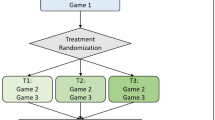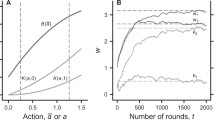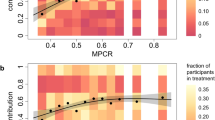Abstract
What motivates human behaviour in social dilemmas? The results of public goods games are commonly interpreted as showing that humans are altruistically motivated to benefit others. However, there is a competing ‘confused learners’ hypothesis: that individuals start the game either uncertain or mistaken (confused) and then learn from experience how to improve their payoff (payoff-based learning). Here we (1) show that these competing hypotheses can be differentiated by how they predict contributions should decline over time; and (2) use metadata from 237 published public goods games to test between these competing hypotheses. We found, as predicted by the confused learners hypothesis, that contributions declined faster when individuals had more influence over their own payoffs. This predicted relationship arises because more influence leads to a greater correlation between contributions and payoffs, facilitating learning. Our results suggest that humans, in general, are not altruistically motivated to benefit others but instead learn to help themselves.
This is a preview of subscription content, access via your institution
Access options
Access Nature and 54 other Nature Portfolio journals
Get Nature+, our best-value online-access subscription
$29.99 / 30 days
cancel any time
Subscribe to this journal
Receive 12 digital issues and online access to articles
$119.00 per year
only $9.92 per issue
Buy this article
- Purchase on Springer Link
- Instant access to full article PDF
Prices may be subject to local taxes which are calculated during checkout




Similar content being viewed by others
Data availability
Figures 2 and 3 and Supplementary Figs. 3–5 have associated raw data available from the Dryad Digital Repository (https://doi.org/10.5061/dryad.fn2z34tsv). There are no restrictions on data availability.
Code availability
The R code for the simulation study is included in the Dryad Digital Repository (https://doi.org/10.5061/dryad.fn2z34tsv).
References
Bshary, R. & Raihani, N. J. Helping in humans and other animals: a fruitful interdisciplinary dialogue. Proc. Biol. Sci. 284, 20170929 (2017).
Apicella, C. L. & Silk, J. B. The evolution of human cooperation. Curr. Biol. 29, R447–R450 (2019).
Miller, G. Social distancing prevents infections, but it can have unintended consequences. Science https://doi.org/10.1126/science.abb7506 (2020).
Wynes, S. & Nicholas, K. A. The climate mitigation gap: education and government recommendations miss the most effective individual actions. Environ. Res. Lett. 12, 074024 (2017).
Ledyard, J. in Handbook of Experimental Economics (eds Kagel, J. H. & Roth, A. E.) 253–279 (Princeton Univ. Press, 1995).
Zelmer, J. Linear public goods experiments: a meta-analysis. Exp. Econ. 6, 299–310 (2003).
Chaudhuri, A. Sustaining cooperation in laboratory public goods experiments: a selective survey of the literature. Exp. Econ. 14, 47–83 (2011).
Arifovic, J. & Ledyard, J. Individual evolutionary learning, other-regarding preferences, and the voluntary contributions mechanism. J. Public Econ. 96, 808–823 (2012).
Fehr, E. & Schmidt, K. M. A theory of fairness, competition, and cooperation. Q. J. Econ. 114, 817–868 (1999).
Fehr, E. & Fischbacher, U. The nature of human altruism. Nature 425, 785–791 (2003).
Camerer, C. F. & Fehr, E. When does ‘Economic Man’ dominate social behavior? Science 311, 47–52 (2006).
Camerer, C. F. Experimental, cultural, and neural evidence of deliberate prosociality. Trends Cogn. Sci. 17, 106–108 (2013).
Gachter, S., Kolle, F. & Quercia, S. Reciprocity and the tragedies of maintaining and providing the commons. Nat. Hum. Behav. 1, 650–656 (2017).
Fehr, E. & Schurtenberger, I. Normative foundations of human cooperation. Nat. Hum. Behav. 2, 458–468 (2018).
Weber, T. O., Weisel, O. & Gächter, S. Dispositional free riders do not free ride on punishment. Nat. Commun. 9, 2390 (2018).
Fischbacher, U., Gachter, S. & Fehr, E. Are people conditionally cooperative? Evidence from a public goods experiment. Econ. Lett. 71, 397–404 (2001).
Fischbacher, U. & Gachter, S. Social preferences, beliefs, and the dynamics of free riding in public goods experiments. Am. Econ. Rev. 100, 541–556 (2010).
Thoni, C. & Volk, S. Conditional cooperation: review and refinement. Econ. Lett. 171, 37–40 (2018).
Andreoni, J. Cooperation in public-goods experiments—kindness or confusion. Am. Econ. Rev. 85, 891–904 (1995).
Palfrey, T. R. & Prisbrey, J. E. Altruism, reputation and noise in linear public goods experiments. J. Public Econ. 61, 409–427 (1996).
Palfrey, T. R. & Prisbrey, J. E. Anomalous behavior in public goods experiments: how much and why? Am. Econ. Rev. 87, 829–846 (1997).
Houser, D. & Kurzban, R. Revisiting kindness and confusion in public goods experiments. Am. Econ. Rev. 92, 1062–1069 (2002).
Cooper, D. J. & Stockman, C. K. Fairness and learning: an experimental examination. Games Econ. Behav. 41, 26–45 (2002).
Janssen, M. A. & Ahn, T. K. Learning, signaling, and social preferences in public-good games. Ecol. Soc. 11, 21 (2006).
Burton-Chellew, M. N. & West, S. A. Prosocial preferences do not explain human cooperation in public-goods games. Proc. Natl Acad. Sci. USA 110, 216–221 (2013).
Burton-Chellew, M. N., Nax, H. H. & West, S. A. Payoff-based learning explains the decline in cooperation in public goods games. Proc. Biol. Sci. 282, 20142678 (2015).
Burton-Chellew, M. N., El Mouden, C. & West, S. A. Conditional cooperation and confusion in public-goods experiments. Proc. Natl Acad. Sci. USA 113, 1291–1296 (2016).
Andreozzi, L., Ploner, M. & Saral, A. S. The stability of conditional cooperation: beliefs alone cannot explain the decline of cooperation in social dilemmas. Sci. Rep. 10, 13610 (2020).
Shapiro, D. A. The role of utility interdependence in public good experiments. Int. J. Game Theory 38, 81–106 (2009).
Ferraro, P. J. & Vossler, C. A. The source and significance of confusion in public goods experiments. B.E. J. Econ. Anal. Policy 10, 53 (2010).
Bayer, R. C., Renner, E. & Sausgruber, R. Confusion and learning in the voluntary contributions game. Exp. Econ. 16, 478–496 (2013).
Kummerli, R., Burton-Chellew, M. N., Ross-Gillespie, A. & West, S. A. Resistance to extreme strategies, rather than prosocial preferences, can explain human cooperation in public goods games. Proc. Natl Acad. Sci. USA 107, 10125–10130 (2010).
Saijo, T. & Nakamura, H. The spite dilemma in voluntary contribution mechanism experiments. J. Confl. Resolut. 39, 535–560 (1995).
Brunton, D., Hasan, R. & Mestelman, S. The ‘spite’ dilemma: spite or no spite, is there a dilemma? Econ. Lett. 71, 405–412 (2001).
Cox, C. A. & Stoddard, B. Strategic thinking in public goods games with teams. J. Public Econ. 161, 31–43 (2018).
Gachter, S. in Psychology and Economics: a Promising New Cross-disciplinary Field (eds Frey, B. S. & Stuzter, A.) 19–50 (MIT Press, 2007).
Bowles, S. Policies designed for self-interested citizens may undermine ‘the moral sentiments’: evidence from economic experiments. Science 320, 1605–1609 (2008).
Bowles, S. & Hwang, S. H. Social preferences and public economics: mechanism design when social preferences depend on incentives. J. Public Econ. 92, 1811–1820 (2008).
Miller, J. H. & Andreoni, J. Can evolutionary dynamics explain free riding in experiments? Econ. Lett. 36, 9–15 (1991).
Nash, J. F. Equilibrium points in N-person games. Proc. Natl Acad. Sci. USA 36, 48–49 (1950).
Trivers, R. L. in Cooperation in Primates and Humans: Mechanisms and Evolution (eds Kappeler, P. M. & van Schaik, C. P.) 67–83 (Springer-Verlag, 2006).
Burton-Chellew, M. N., El Mouden, C. & West, S. A. Evidence for strategic cooperation in humans. Proc. Biol. Sci. 284, 20170689 (2017).
Reuben, E. & Suetens, S. Revisiting strategic versus non-strategic cooperation. Exp. Econ. 15, 24–43 (2012).
Bigoni, M. & Suetens, S. Feedback and dynamics in public good experiments. J. Econ. Behav. Organ. 82, 86–95 (2012).
Fiala, L. & Suetens, S. Transparency and cooperation in repeated dilemma games: a meta study. Exp. Econ. 20, 755–771 (2017).
Cartwright, E. J. & Lovett, D. Conditional cooperation and the marginal per capita return in public good games. Games 5, 234–256 (2014).
Simmons, J. P., Nelson, L. D. & Simonsohn, U. False-positive psychology: undisclosed flexibility in data collection and analysis allows presenting anything as significant. Psychol. Sci. 22, 1359–1366 (2011).
Head, M. L., Holman, L., Lanfear, R., Kahn, A. T. & Jennions, M. D. The extent and consequences of P-hacking in science. PLoS Biol. https://dx.doi.org10.1371/journal.pbio.1002106 (2015).
Henrich, J. et al. ‘Economic man’ in cross-cultural perspective: behavioral experiments in 15 small-scale societies. Behav. Brain Sci. https://doi.org/10.1017/S0140525X05000142 (2005).
Henrich, J., Heine, S. J. & Norenzayan, A. Most people are not WEIRD. Nature 466, 29–29 (2010).
Kocher, M. G., Martinsson, P. & Visser, M. Does stake size matter for cooperation and punishment? Econ. Lett. 99, 508–511 (2008).
Karagozoglu, E. & Urhan, U. B. The effect of stake size in experimental bargaining and distribution games: a survey. Group Decis. Negot. 26, 285–325 (2017).
Larney, A., Rotella, A. & Barclay, P. Stake size effects in ultimatum game and dictator game offers: a meta-analysis. Organ. Behav. Hum. Decis. Process. 151, 61–72 (2019).
Plott, C. R. & Zeiler, K. The willingness to pay-willingness to accept gap, the ‘endowment effect,’ subject misconceptions, and experimental procedures for eliciting valuations. Am. Econ. Rev. 95, 530–545 (2005).
Chou, E., McConnell, M., Nagel, R. & Plott, C. R. The control of game form recognition in experiments: understanding dominant strategy failures in a simple two person ‘guessing’ game. Exp. Econ. 12, 159–179 (2009).
Gachter, S. & Thoni, C. Social learning and voluntary cooperation among like-minded people. J. Eur. Econ. Assoc. 3, 303–314 (2005).
Gunnthorsdottir, A., Houser, D. & McCabe, K. Disposition, history and contributions in public goods experiments. J. Econ. Behav. Organ. 62, 304–315 (2007).
Gunnthorsdottir, A., Vragov, R., Seifert, S. & McCabe, K. Near-efficient equilibria in contribution-based competitive grouping. J. Public Econ. 94, 987–994 (2010).
Nax, H. H., Murphy, R. O., Duca, S. & Helbing, D. Contribution-based grouping under noise. Games 8, 50 (2017).
Nax, H. H., Murphy, R. O. & Helbing, D. in Social Dilemmas, Institutions, and the Evolution of Cooperation (eds Ben Jann, B. & Przepiorka, W.) 447–469 (de Gruyter Oldenbourg, 2017).
McAuliffe, W. H. B., Burton-Chellew, M. N. & McCullough, M. E. Cooperation and learning in unfamiliar situations. Curr. Dir. Psychol. Sci. 28, 436–440 (2019).
Rand, D. G. et al. Social heuristics shape intuitive cooperation. Nat. Commun. 5, 3677 (2014).
Bear, A. & Rand, D. G. Intuition, deliberation, and the evolution of cooperation. Proc. Natl Acad. Sci. USA 113, 936–941 (2016).
R: a language and environment for statistical computing. Version 3.6 (R Foundation for Statistical Computing, 2017).
Wickham, H. ggplot2: Elegant Graphics for Data Analysis (Springer-Verlag, 2009).
Greiner, B. Subject pool recruitment procedures: organizing experiments with ORSEE. J. Econ. Sci. Assoc. 1, 114–125 (2015).
Fischbacher, U. z-Tree: Zurich toolbox for ready-made economic experiments. Exp. Econ. 10, 171–178 (2007).
Eckel, C. & Grossman, P. J. in Handbook of Experimental Economics Results Vol. 1 (eds Plott, C. R. & Smith, V. L.) Ch. 57 (North-Holland, 2008).
Balliet, D., Li, N. P., Macfarlan, S. J. & Van Vugt, M. Sex differences in cooperation: a meta-analytic review of social dilemmas. Psychol. Bull. 137, 881–909 (2011).
Garson, G. D. (ed.) Hierarchical Linear Modeling: Guide and Applications (SAGE, 2013).
Acknowledgements
Funding provided by Calleva Research Centre for Evolution and Human Sciences, Magdalen College, Oxford (M.N.B.-C. and S.A.W.), ERC advanced grant 834164 (S.A.W.) and the University of Lausanne, Switzerland (M.N.B.-C.). The funders had no role in study design, data collection and analysis, decision to publish or preparation of the manuscript. Thanks to Z. Griffiths for help with data collection, L. Lehmann for discussions and P. Barclay for reviewing the manuscript.
Author information
Authors and Affiliations
Contributions
M.N.B.-C. and S.A.W. conceived and designed the research. M.N.B.-C. collected the data and performed the analyses. M.N.B.-C. and S.A.W. wrote the article.
Corresponding author
Ethics declarations
Competing interests
The authors declare no competing interests.
Additional information
Peer review information Nature Human Behaviour thanks Pat Barclay and the other, anonymous, reviewer(s) for their contribution to the peer review of this work.
Publisher’s note Springer Nature remains neutral with regard to jurisdictional claims in published maps and institutional affiliations.
Supplementary information
Supplementary Information
Supplementary Figs. 1–6, Supplementary Tables 1–9, Supplementary Methods and Supplementary Results.
Rights and permissions
About this article
Cite this article
Burton-Chellew, M.N., West, S.A. Payoff-based learning best explains the rate of decline in cooperation across 237 public-goods games. Nat Hum Behav 5, 1330–1338 (2021). https://doi.org/10.1038/s41562-021-01107-7
Received:
Accepted:
Published:
Issue Date:
DOI: https://doi.org/10.1038/s41562-021-01107-7



